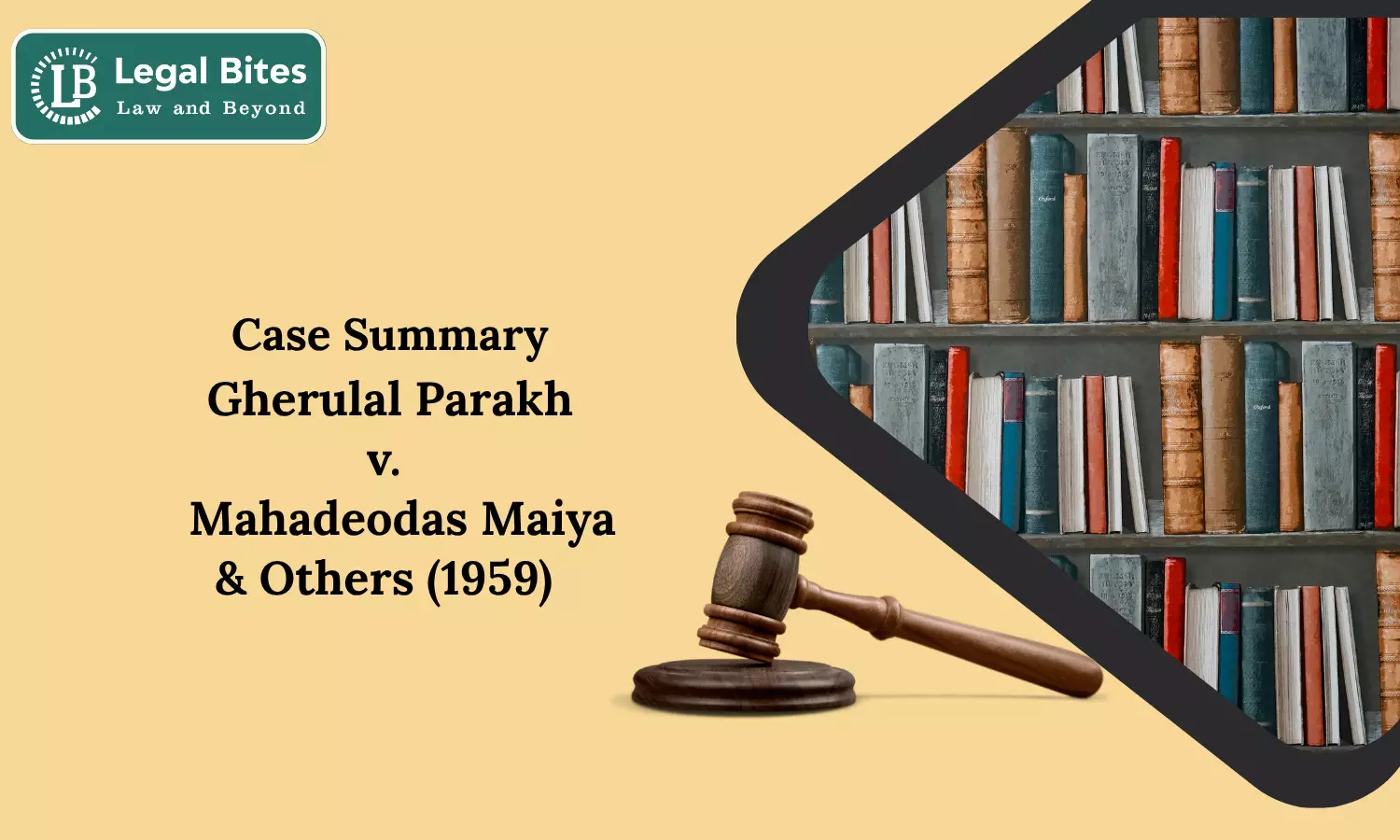Case Summary: Gherulal Parakh v. Mahadeodas Maiya & Others (1959) | Distinction Between Void and Illegal Agreements
A landmark judgment clarifying that wagering agreements are void but not illegal, with the Supreme Court interpreting Sections 23 and 30 of the Contract Act.

The landmark judgment of the Supreme Court in Gherulal Parakh v. Mahadeodas Maiya and Others, decided on 26 March 1959, clarified the legal position on wagering contracts and their collateral arrangements under Indian law. It revolved around whether a partnership agreement aimed at entering into wagering transactions is unlawful under Section 23 of the Indian Contract Act, 1872, despite such wagering agreements being declared void under Section 30.The decision profoundly influenced...
The landmark judgment of the Supreme Court in Gherulal Parakh v. Mahadeodas Maiya and Others, decided on 26 March 1959, clarified the legal position on wagering contracts and their collateral arrangements under Indian law. It revolved around whether a partnership agreement aimed at entering into wagering transactions is unlawful under Section 23 of the Indian Contract Act, 1872, despite such wagering agreements being declared void under Section 30.
The decision profoundly influenced Indian jurisprudence by distinguishing between “void” and “illegal” contracts, restricting the interpretation of the terms “public policy” and “immoral,” and thereby upholding commercial sanctity in limited scenarios involving speculative ventures.
Factual Background
Parties Involved
Appellant: Gherulal Parakh
Respondents: Mahadeodas Maiya and his sons
Nature of Agreement
Gherulal Parakh and Mahadeodas Maiya, managers of two separate joint Hindu families, entered into a partnership agreement to engage in forward trading in wheat with two firms located in Hapur—Messrs. Mulchand Gulzarimull and Baldeosahay Surajmull. The contracts involved speculative deals that had no intention of actual delivery of goods, effectively amounting to wagering transactions.
As per their agreement:
- Respondent No. 1 was to execute the forward contracts on behalf of the firm.
- The resulting profits and losses were to be shared equally.
Eventually, the speculative dealings led to losses. Mahadeodas paid the full amount to the firms and sued Gherulal to recover half of the loss, in line with their agreement. Gherulal denied liability, contending that the agreement itself was illegal under Section 23 of the Indian Contract Act.
Procedural History
Trial Court (Subordinate Judge, Darjeeling)
- Held that the transactions were wagering in nature and thus the partnership formed for such a purpose was void and unlawful under Section 23.
- Dismissed the suit.
High Court (Calcutta)
- Reversed the Trial Court’s findings.
Held that:
- The wagering contracts were void under Section 30 but not forbidden by law.
- The partnership agreement, being a collateral contract, was not illegal under Section 23.
Partially decreed the suit, awarding Mahadeodas ₹3,807.
Issues
The key legal questions before the Supreme Court were:
- Whether a partnership agreement formed for entering into wagering transactions is unlawful under Section 23 of the Indian Contract Act.
- Whether a wagering agreement, although void under Section 30, is also “forbidden by law” or “opposed to public policy” under Section 23.
- Whether such an agreement is immoral under the Indian legal framework or the Hindu Law doctrine of pious obligation.
Supreme Court's Observations and Findings
1. Distinction Between Void and Illegal
- A void contract is unenforceable but not necessarily forbidden by law.
- An illegal contract is one that is explicitly prohibited by law and also void.
- Wagering contracts are void under Section 30 but not illegal unless declared so by statute.
- Therefore, collateral transactions, like partnership agreements, are not hit by Section 23.
“Although a wagering contract was void and unenforceable under Section 30... it was not forbidden by law and an agreement collateral to such a contract was not unlawful under Section 23.” – Subba Rao, J.
2. Partnership in Wagering Transactions Not Unlawful
The agreement between the appellant and the respondent to share profits and losses from forward trading (dealing in differences) did not violate the law per se.
As long as the primary object is not explicitly illegal, a collateral partnership contract is valid.
3. Doctrine of Public Policy
- Public Policy is a vague concept; courts must be cautious.
- The Court reaffirmed the position that wagering contracts do not offend public policy.
- Quoted Lord Atkin and Lord Wright to assert that courts should not invent new heads of public policy unless the harm is incontestable.
4. Immorality and Hindu Law
- Immorality under Section 23 has a narrow interpretation: limited to sexual immorality.
- Hindu Law's moral condemnation of gambling does not render such contracts unlawful under the Indian Contract Act.
- Hindu doctrines, including pious obligation, are not applicable in the context of commercial contracts governed by the Contract Act.
Precedents Relied Upon
Indian Cases:
- Pringle v. Jafar Khan (1883): Held that agent recovering payment on wagering contracts is enforceable.
- Beni Madho Das v. Kaunsal Kishor Dhusar (1900): Loan taken to pay gambling debt is recoverable.
- Md. Gulam Mustafakhan v. Padamsi (1923): Payment by one partner in wagering can be recovered from another.
Privy Council:
- Ramloll Thackoorseydass v. Soojumnull Dhondmull (1848): Wagering not against public policy.
- Doolubdas Pettamberdass v. Ramloll (1850): Hindu Law did not prohibit wagering.
English Cases:
- Thacker v. Hardy (1878): Wagering contract void but collateral contract enforceable.
- Hyams v. Stuart King (1908): New promise to pay under wagering not enforceable.
- Hill v. William Hill (1949): Wagering contracts not enforceable even under new agreement.
- Jaffrey & Co. v. Bamford (1921): Partnership to bet is not per se illegal.
Judgment and Reasoning
The Supreme Court dismissed the appeal, holding that:
- The partnership between Gherulal Parakh and Mahadeodas Maiya was not unlawful under Section 23.
- Even though the underlying transactions were wagers (and hence void under Section 30), the partnership agreement was collateral and therefore valid.
- There was no contravention of public policy or morality as per settled principles of Indian and English law.
- Section 23 requires strict interpretation and wagering does not fall under any of its heads—neither as something forbidden by law, nor as immoral, nor as opposed to public policy.
Conclusion and Significance
The Supreme Court’s ruling in Gherulal Parakh v. Mahadeodas Maiya is a landmark decision clarifying the contours of:
- Sections 23 and 30 of the Indian Contract Act;
- The legal treatment of wagering agreements and collateral contracts;
- The distinction between “void” and “illegal” agreements.
- The restricted scope of public policy and immorality under Indian contract law.

Ananya Gupta
Ananya is an alumnus of the prestigious Government Law College, Mumbai, specializing in Corporate Law. A passionate legal scholar, she is deeply involved in research, focusing on corporate governance and regulatory frameworks.
